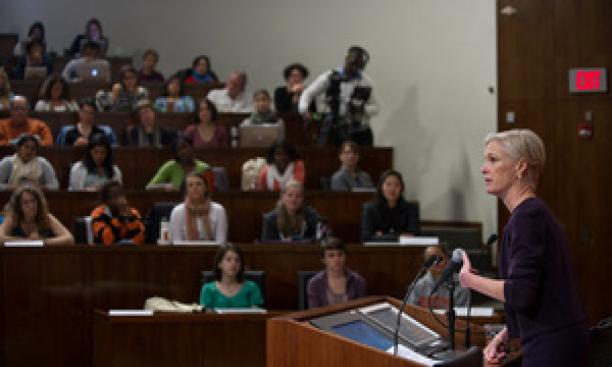

Cecile Richards' speech on politics and women's health drew a capacity audience to Dodds Auditorium March 28. (Photo: Sameer A. Khan/Courtesy Woodrow Wilson School)
In a talk that ended with a standing ovation by a capacity crowd in Dodds Auditorium of Robertson Hall March 28, Planned Parenthood president Cecile Richards defended health care rights for women, lauded the work done by her organization, and touted technology as the key to disseminating information.
“In the past year, there has been an unrelenting attack on young women going to Planned Parenthood,” said Richards, whose lecture, “Keeping Politics Out of Women’s Health,” was part of the Woodrow Wilson School’s Leadership and Governance Program that brings prominent policy makers to campus. “Partisan politics is driving sex education in this country,” she said. “We literally now are fighting to keep preventive care in this country.”
Since becoming head of Planned Parenthood Federation of America in 2006, Richards, daughter of the late Texas governor Ann Richards, has created a significant online presence for the organization. Last year, Planned Parenthood’s website had 33 million visitors and she hopes technology is “a way around barriers to accessing health care. Despite all we have been able to do in this country — we invented the iPad — we are one of the most backward when it comes to reproductive access.”
Citing a statistic that four out of five 13- to 29-year-olds have cell phones, Richards believes that Planned Parenthood can “get in right at the moment of need” and give them the information they seek. “With cell phones, information is literally in the hands of people who formerly had little access,” she said. “This is bridging the digital divide . . . erasing the lines for people of color.”
Acknowledging that “you used to just get bad [sex] information at slumber parties or on the school bus, but now you can get it online,” Richards said Planned Parenthood is using texting and chatting, telemedicine (in which people are connected to those with medical expertise), and digital sex education to get the facts across. “Young people are looking for this information and we have to be there for them,” she said.
Reminding the audience of students and community members that “96 years ago Margaret Sanger was arrested for just passing out pamphlets on birth control,” Richards said last year more than 40 million people had access to birth control information through Planned Parenthood’s website. “That’s progress, right?”
